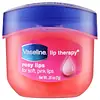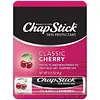What's inside
What's inside
 Concerns
Concerns

No concerns
 Ingredients Side-by-side
Ingredients Side-by-side

Petrolatum
EmollientArachidyl Propionate
EmollientCamphor
MaskingCopernicia Cerifera Wax
Cetyl Alcohol
EmollientParfum
MaskingIsopropyl Lanolate
EmollientIsopropyl Myristate
EmollientLanolin
EmollientCitrus Limon Peel Oil
MaskingParaffinum Liquidum
EmollientMaltol
MaskingOctyldodecanol
EmollientParaffin
PerfumingPhenyl Trimethicone
Skin ConditioningCI 15850
Cosmetic ColorantSaccharin
MaskingPalau White Clay
Humectant
 Reviews
Reviews

Ingredients Explained
These ingredients are found in both products.
Ingredients higher up in an ingredient list are typically present in a larger amount.
Ci 15850 is the pigment color red. It is an azo dye and created synthetically.
Azo dyes need to be thoroughly purified before use. This allows them to be more stable and longer-lasting.
This ingredient is common in foundations, lipsticks, and blushes. This color is described as brown/orangey red.
It has many secondary names such as Red 6 and Red 7. According to a manufacturer, Red 6 usually contains aluminum.
Learn more about CI 15850Petrolatum is more commonly known as petroleum jelly. It is created by mixing waxes and mineral oils.
This ingredient is effective at reducing water loss by 99%. This is because it is an occlusive. Occlusives create a hydrophobic barrier on the skin to prevent evaporation. This property makes it great for hydrating dry skin.
Pro tip: Use occlusives, such as this ingredient, on damp skin for the best results.
The quality or origin of petrolatum is only known when disclosed by the brand. Most cosmetic petrolatum has gone through several purification stages.
Another benefit of occlusives is it protects your skin against infection or allergies.
Petrolatum may not be safe for fungal-acne. Studies show mineral oil / petroleum leads to the growth of M. Furfur, a type of yeast.
Learn more about Petrolatum